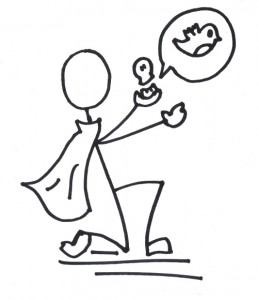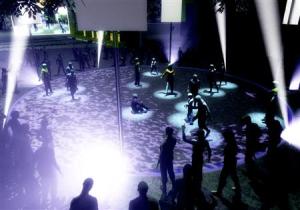 Take one part theatre, and one part twitter. What is the outcome? Twespians.
Take one part theatre, and one part twitter. What is the outcome? Twespians.
Last night I was lucky enough to be part of a mini revolution in the way that I communicate with people in theatre, by taking part in a TweetUp. The idea of a tweetup is essentially a group of Twitter users meet at a set location and time to mingle, talk and have a good few drinks. Twespians is the theatre version.
I’ll be open and admit that the effect that Twitter has had upon my life is quite strong. It’s allowed me to express a huge passion I have with other equally passionate people. It has scored me tickets for shows, and equally kept me up to date with the latest theatre news and gossip. Andrew Llyod Webber has cancer? Through Twitter. Peter Brook as part of the new Bite Festival. Twitter. Too Close To The Sun, the biggest flop to hit west end … Twitter. What about the Donmar’s bad attempt at recycling old brochures? Reported through TwitPic, and Twitter.
Twitter has allowed me to connect with people from all over the world, who share the same drive and passion that I have. It’s a slow process, that develops over the course of many months. Conversation is brief but to the point, with only 140 characters there is no waffling allowed. Strictly a ‘to the point’ matter.
Whilst all of this is great for communicating over the internet, what happens when you bring these people together in the real world? Twespians answered this questionl last night, by organising a TweetUp as part of Social Media Week.
Upon arrival you are given a name badge to which you fill in your username and favourite show. You get yourself a drink at the bar, and then you begin to talk to people. The course of the night is extremely varied, depending on who you talk with. There are several people who I’ve met off Twitter to see various shows with before, yet equally there are those who I’ve solely spoken to through 140 characters at a time.
The night was absurd, surreal and brilliant all at once.
To have in one room, such a mix of people from all forms of theatre interests and jobs – talking together is remarkable. From journalists, bloggers, actors, directors, students, social media artists, administrators, marketers and facilitators. You almost have to take a moment to take in what is actually happening around you.
If Twitter is to be integrated more into the theatre industry then it is through an event such as Twespians TweetUp that we can begin to break down these boundaries of theatre roles, and begin to work towards something greater. What that is I don’t know. Networkings, Jobs, Drinking Buddies… well… the possibilities are too vast to list.
One thing that did strike me though is the possibilities of such an event. A group of students from Queen Mary’s University studying Drama and Physical Theatre joined the event. Hearing their passion for an industry they are desperate to be in is inspiring, yet equally their craving for information and advice from people already working or performing showed how useful such an event can be to people.
People can laugh at the way in which people engage with the internet and social media, but there is no denying the power and potential it has. If you can write an opera through twitter and produce full length twitter plays – what can you do with it?
Interested in Twespians? Check out of the website and twitter account for more information. The next Twespians TweetUp will be announced shortly, so stayed tuned.



 Posted by Jakeyo
Posted by Jakeyo 
